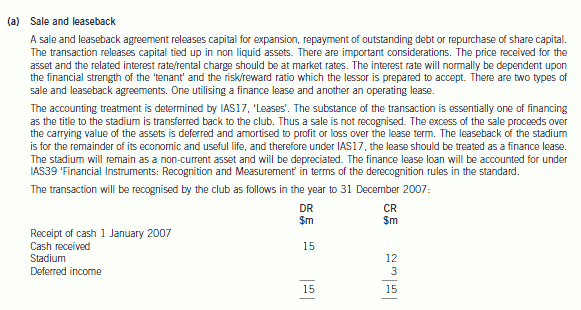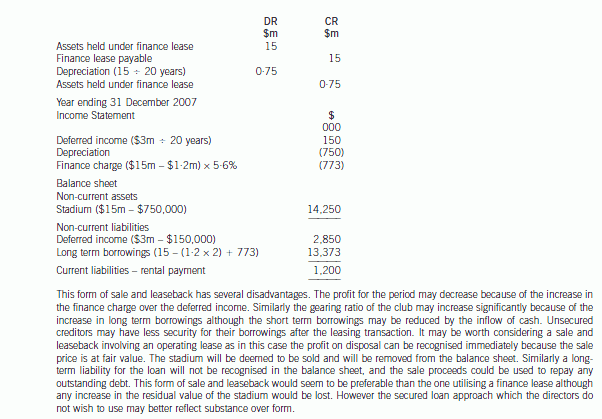ACCA考试F3考试试题每日一练(2020-08-14)
发布时间:2020-08-14
备考2020年ACCA考试的小伙伴赶紧来围观,51题库考试学习网为大家准备了ACCA考试F3考试试题,以供小伙伴们备考练习。
1. Sales revenue
should be recognised when goods and services have been supplied; costs are
incurred when goods and services have been received.
Which accounting concept governs the above?
A The business entity concept
B The materiality concept
C The accruals concept
D The duality concept
答案:C
2. Which
accounting concept states that omitting or misstating this information could
influence users of the financial statements?
A The consistency concept
B The accruals concept
C The materiality concept
D The going concern concept
答案:C
3. According to
the IASB\'s Conceptual Framework for Financial Reporting, which TWO of the
following are part of faithful representation?
1 It is neutral
2 It is relevant
3 It is presented fairly
4 It is free from material error
A 1and2
B 2and3
C 1and4
D 3and4
答案:C
4. Which ONE of
the following statements correctly describes the contents of the Statement of
Financial Position?
A A list of ledger balances shown in debit
and credit columns
B A list of all the assets owned and all
the liabilities owed by a business
C A record of income generated and
expenditure incurred over a given period
D A record of the amount of cash generated
and used by a company in a given period
答案:B
5. Which ONE of
the following statements correctly describes the contents of the Statement of
Profit or Loss? \'
A A list of ledger balances shown in debit
and credit columns
B A list of all the assets owned and all
the liabilities owed by a business
C A record of income generated and
expenditure incurred over a given period
D A record of the amount of cash generated
and used by a company in a given period
答案:C
以上就是51题库考试学习网分享给大家的ACCA考试F3考试试题的内容,希望可以帮助到大家。如果想要了解更多关于ACCA考试的试题,敬请关注51题库考试学习网!
下面小编为大家准备了 ACCA考试 的相关考题,供大家学习参考。
4 In addition to the application form. and interview, references provide further confidential information about the
prospective employee.
Required:
(a) Define the purpose of a reference. (3 marks)
4 Overview:
References are used by most employers as a key part of their selection process, but mainly to verify facts about the candidate rather
than as an aid to decision making. The reference check is usually the last stage in the selection process and referees should be
contacted only after permission has been given by the applicant. Good referees are almost certain to know more about the
applicant than the selector and it would be foolish not to seek their advice or treat the reference check as a mere formality.
Part (a)
References provide further confidential information about the prospective employee. This may be of varying value, as the reliability
of all but the most factual information must be in question.
The purpose of a reference is to obtain straightforward factual information confirming the nature of the applicant’s previous job(s),
the period of employment, current pay and the circumstances for wishing to leave the present employment and to seek opinions
about the applicant’s personality and other attributes. However, allowance must be made for prejudice and charity.
2 The draft financial statements of Rampion, a limited liability company, for the year ended 31 December 2005
included the following figures:
$
Profit 684,000
Closing inventory 116,800
Trade receivables 248,000
Allowance for receivables 10,000
No adjustments have yet been made for the following matters:
(1) The company’s inventory count was carried out on 3 January 2006 leading to the figure shown above. Sales
between the close of business on 31 December 2005 and the inventory count totalled $36,000. There were no
deliveries from suppliers in that period. The company fixes selling prices to produce a 40% gross profit on sales.
The $36,000 sales were included in the sales records in January 2006.
(2) $10,000 of goods supplied on sale or return terms in December 2005 have been included as sales and
receivables. They had cost $6,000. On 10 January 2006 the customer returned the goods in good condition.
(3) Goods included in inventory at cost $18,000 were sold in January 2006 for $13,500. Selling expenses were
$500.
(4) $8,000 of trade receivables are to be written off.
(5) The allowance for receivables is to be adjusted to the equivalent of 5% of the trade receivables after allowing for
the above matters, based on past experience.
Required:
(a) Prepare a statement showing the effect of the adjustments on the company’s net profit for the year ended
31 December 2005. (5 marks)

3 Seejoy is a famous football club but has significant cash flow problems. The directors and shareholders wish to take
steps to improve the club’s financial position. The following proposals had been drafted in an attempt to improve the
cash flow of the club. However, the directors need advice upon their implications.
(a) Sale and leaseback of football stadium (excluding the land element)
The football stadium is currently accounted for using the cost model in IAS16, ‘Property, Plant, and Equipment’.
The carrying value of the stadium will be $12 million at 31 December 2006. The stadium will have a remaining
life of 20 years at 31 December 2006, and the club uses straight line depreciation. It is proposed to sell the
stadium to a third party institution on 1 January 2007 and lease it back under a 20 year finance lease. The sale
price and fair value are $15 million which is the present value of the minimum lease payments. The agreement
transfers the title of the stadium back to the football club at the end of the lease at nil cost. The rental is
$1·2 million per annum in advance commencing on 1 January 2007. The directors do not wish to treat this
transaction as the raising of a secured loan. The implicit interest rate on the finance in the lease is 5·6%.
(9 marks)
Required:
Discuss how the above proposals would be dealt with in the financial statements of Seejoy for the year ending
31 December 2007, setting out their accounting treatment and appropriateness in helping the football club’s
cash flow problems.
(Candidates do not need knowledge of the football finance sector to answer this question.)


(c) State the specific inquiries you should make of Robson Construction Co’s management relevant to its
accounting for construction contracts. (6 marks)
(c) Specific inquiries – accounting for construction contracts
Tutorial note: This answer is illustrative of the types of inquiry that should be made. Other relevant answer points will be
awarded similar credit. For each full mark to be earned an inquiry should address the specifics of Robson (e.g. that its
accounting policies are ‘generally less prudent’). The identification of asset overstatement/liability understatement may
reduce the purchase price offered by Prescott.
■ Are any constructions being undertaken without signed contracts?
Tutorial note: Any expenditure on constructions without contracts (e.g. of a speculative nature, perhaps to keep the
workforce employed) must be accounted for under IAS ‘Inventories’; revenue cannot be recognised nor profit taken.
■ Is full provision made for future losses foreseen on loss-making contracts?
Tutorial note: The information in the brief is that ‘provisions are made’. The level of provision is not indicated and
could be less than full.
■ Which contracts started during the year are likely to be/have been identified as loss-making (for which no provision has
yet been made)?
Tutorial note: Profits and losses are only determined by contract at each financial year end.
■ What are management’s assumptions and judgments on the likely future outcome on the Sarwar contract (and other
actual and contingent liabilities)?
Tutorial note: Robson would be imprudent if it underestimates the probability of an unfavourable outcome (or
overestimates the likelihood of successful recourse).
■ What claims history has Robson experienced? (What proportion of contracts have been subject to claims? What
proportion of claims brought have been successful? How have they been settled? Under insurance? Out-of-court
settlement?) How effective are the penalty clauses? (Is Robson having to pay penalties for overrunning on contracts?)
■ What are the actual useful lives of assets used in construction? What level of losses are made on disposal?
Tutorial note: If such assets are depreciated over useful lives that are estimated to be too long, depreciation costs
incurred to date (and estimated depreciation to be included in costs to completion) will be understated. This will result
in too much profit/too little loss being calculated on contracts.
■ What is the cause of losses on contracts? For example, if due to theft of building supplies Robson’s management is not
exercising sufficient control over the company’s assets.
声明:本文内容由互联网用户自发贡献自行上传,本网站不拥有所有权,未作人工编辑处理,也不承担相关法律责任。如果您发现有涉嫌版权的内容,欢迎发送邮件至:contact@51tk.com 进行举报,并提供相关证据,工作人员会在5个工作日内联系你,一经查实,本站将立刻删除涉嫌侵权内容。
- 2020-08-14
- 2019-03-14
- 2020-10-12
- 2019-03-09
- 2020-08-14
- 2019-01-05
- 2019-03-10
- 2020-10-18
- 2020-08-14
- 2020-08-14
- 2020-08-14
- 2020-10-18
- 2019-03-14
- 2020-08-14
- 2020-08-14
- 2020-08-14
- 2019-03-09
- 2020-10-18
- 2020-08-14
- 2020-08-14
- 2020-10-18
- 2020-08-14
- 2020-08-14
- 2020-08-14
- 2020-10-18
- 2020-08-14
- 2020-08-14
- 2020-10-18
- 2020-10-12
- 2020-08-14